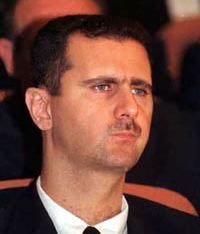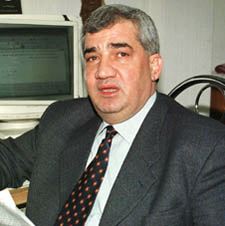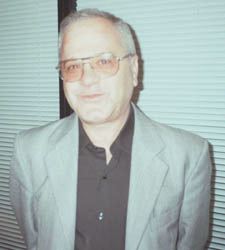 |
| Vol. 3 No. 2 | Table of Contents MEIB Main Page | February 2001 |
 |
| Bashar Assad |
Suddenly, however, it all came crashing down. The savage beating of a prominent liberal reformer late last month, followed by the filing of criminal charges against the leader of Syria's nascent parliamentary opposition bloc and a series of unprecedented warnings from the government have cast a pale of darkness over the country. Whether this sudden shift represents an about face by President Assad or the resurgent influence of the regime's security barons remains to be seen, but the permissible limits of political dissent have been clearly redrawn for the time being.
Background
Shortly after Assad's ascension as president, a loose network of Syrian intellectuals and businessmen began holding a series of informal gatherings throughout the country to discuss steps to promote political reforms. These civil society activists, who eventually organized under the name Committees for the Revival of Civil Society (Lijan Ihya al-Mujtama' al-Madani) have spearheaded ambitious initiatives to demand greater freedom from the new Syrian leader.
In the beginning, the civil society movement's activities provoked a negative reaction from certain quarters of the Syrian regime. In September, the Beirut-based newspaper Al-Muharrir (which is owned by a Syrian national, Nihad al-Ghadri, who reportedly has close connections to Syrian intelligence) published an attack on the movement, quoting a senior Syrian official who questioned the its stated goals and suggested that its leaders were determined to "legitimize" subversion of the Syrian regime. The article accused them of trying to mimic the experience of Poland, where activists organized under the banner of civil society to wrest power from the communist dictatorship.1
Later that month, 99 liberal Syrian intellectuals, most of them affiliated with the civil society movement, released a statement calling on the Assad regime to end the state of emergency and martial law that has been in effect since 1963; issue a pardon for all political detainees and exiled dissidents; recognize freedoms of assembly and expression; and release the public from restrictive laws and "various forms of surveillance" imposed on it. The state-run media refused even to mention the declaration, and the regime briefly imposed a ban on foreign newspapers that printed the declaration.2
However, against the advice of "old guard" officials in the Syrian regime, Assad soon abandoned such attempts to suppress the movement in favor of a strategy to contain and guide its activities. This was evident in November with the release of over 600 political prisoners, the declaration of a general amnesty, and the closure of the notorious Mazzeh prison.3 Afterwards, Assad met with several reformers affiliated with the committees and informed them that they were welcome to criticize the state on economic matters so long as they did so exclusively in the state-run Syrian press. In addition, many dissidents who had been fired from their jobs in state-run media and educational institutions were reinstated.
Meanwhile, the Assad regime began steps to "re-energize" the so-called National Progressive Front (NPF), a coalition of leftist political parties aligned with the ruling Ba'ath party that was established by the late Hafez Assad in 1972. Rather than risk permitting the establishment of political parties outside of the state's control, which hard-line members of Syria's security apparatus staunchly opposed, Assad began promoting the transformation of the NPF into a state-moderated system of quasi-independent parties that would give Syria the trappings of democracy while containing the political influence of the country's resurgent civil society.
The regime announced that the Ba'ath party's coalition allies in the NPF would be allowed to establish branch offices, openly recruit new members, and publish their own newspapers. In an effort to expand the ruling party's base of support, Assad also declared that the leadership of the Ba'ath party would henceforth be freely elected by its membership. However, Syrian officials gave few indications that the establishment of political parties outside the NPF would be permitted.
This did not fly with the civil society activists, who proceeded last month to organize a second declaration last month--this time signed by over 1,000 intellectuals--which called for more comprehensive political reforms than the earlier declaration. Whereas the first statement neglected to explicitly demand democratization, the second one called for elections to be held "at all levels," under the supervision of an independent judiciary. The second statement also directly criticized Assad's plan to re-energize the NPF as a substitute for authentic political liberalization. "Insisting that the parties grouped under the umbrella of the NPF represent the various forces in Syrian society . . . will prolong the economic, social and political paralysis and stagnation that Syria has been witnessing for some time."4
Government reaction to the statement was initially characterized by what observers are calling "positive neutrality." The authorities did not make any effort to censor Arabic newspapers which published the full text of the document, though it was conspicuously ignored by the state-run Syrian media.
According to Ibrahim Humaydi, the Damascus correspondent of Al-Hayat, the regime's surprisingly docile response to the statement illustrated that an undeclared "alliance" was in the making between liberal intellectuals affiliated with the committees and Assad's reformist trend within the Syrian government.5 This informal alliance was supposedly intended first and foremost to strengthen Assad's position against hard-line members of the regime who oppose political (and economic) liberalization. One Syrian official quoted by Al-Hayat more or less said as much, stressing the need to "support reform . . . so as not to give those who oppose reform the chance to hamper this process."6
Those who organized the statement were quick to portray the initiative as an attempt to work with Assad, rather than against him. Michel Kilo, a prominent academic involved in drafting the statement, said that he and his colleagues were "very grateful for the broad-mindedness of the leadership--represented by President Bashar Assad--which dealt with the document positively."7 In fact, the regime's reaction to the statement was interpreted by many as a green light of sorts--hundreds of additional signatures were added in the days following its initial publication.
The founders of the committee deliberately excluded opposition figures who might be considered politically dangerous by the government. Prominent political figures who were not allowed to participate include Riyad al-Turk, the head of the political bureau of the Syrian Communist Party; Fatih Jamus, a leader of the Communist Action Party who was released from prison last year; and Hasan Abd al-Azim, the head of the National Democratic Alliance.
Nevertheless, Arif Dalila, a well-known economist who has played a leading role in the civil society movement, rejected accusations that its activities were orchestrated by the authorities as a way of letting intellectuals blow off steam. "My discourse is not guided and does not take into account who will like it and who will perceive it as a threat," Dalila told Al-Hayat last month.8
January also witnessed the establishment of two independent political parties which, had they obtained official approved from the government, would have been the first to legally operate since the Ba'athists came to power in March 1963.
 |
| Riyad al-Sayf [Al-Nahar] |
Two days later, parliament member Riyad al-Sayf announced the formation of the Movement for Social Peace (Harakat al-Silm al-Ijtima'i). In November, Sayf made waves when he addressed parliament and criticized the "political and economic monopolies" that have silenced or driven into exile Syria's brightest intellectuals and most gifted entrepreneurs. Sayf, a middle-aged Damascus businessman, attracted over twenty other MP's to his campaign to eliminate restrictions on commercial enterprise and freedom of expression. Members of this so-called "Damascus bloc" included Munzer Mousilli, a former advisor to President Amin al-Hafez who caused a stir last summer when he questioned the assembly's decision to amend Article 68 of the constitution, which requires that the president be at least 40 year old (Bashar was only 34).
Sayf, who had previously been an active participant in the civil society forums but ended his involvement late last year, emphasized that his party is distinct from that movement because it seeks to promote the welfare of "all social strata."9
Storm Clouds on the Horizon
On January 29, the Syrian regime suddenly broke its public silence with a fierce diatribe against the opposition by Syrian Information Minister Adnan Omran. Speaking before a group of Arab and foreign journalists in Damascus, Omran declared that civil society is an "American term" which had recently been given "additional meanings" by "groups that seek to become (political) parties," an apparent reference to Sayf.
Noting that Egyptian human rights activist Saadeddin Ibrahim is currently on trial in Egypt for "receiving money from foreign countries" and performing "security missions at the behest of foreign sides," Omran declared that "neocolonialism no longer relies on armies" and now takes a different form. "This does not mean that we do not believe in freedom as a major demand for all society. But not absolute, blind freedom. Each society has its red lines. Political freedom has red lines. Social freedom has red lines. Cultural freedom has red lines." In Syria, he said, the "political red lines" as defined by the constitution stipulate that "any talk which undermines the unity of society is a threat to society as a whole."10
 |
| Nabil Suleiman [Al-Nahar] |
Less than twenty-four hours after Omran's warning, Syrian novelist Nabil Suleiman was attacked by two unidentified assailants in the coastal city of Latakia, a stronghold of minority Alawite support for the regime. Suleiman, a prominent organizer of the civil society committees, was hospitalized with cuts on his head, face, and chest.
Most liberal reformers are convinced that hard-line figures in the regime were behind the assault. According to Syrian novelist Ne'meh Khaled, Suleiman had recently been summoned for interrogation by a "security agency" regarding references to the role of Syrian intelligence in one of his novels. He was interrogated a second time, she said, after hosting a forum at his home in Latakia on January 15 in which the participants called for political reforms. Khaled also said one of the front doors of Suleiman's car was smashed on January 25.11
The attack on Suleiman sent shock waves through the reform movement. A group of intellectuals went to the headquarters of the writers' union the next day to express solidarity with Suleiman against "the forces of darkness, whoever they may be."12 According to a Damascus source quoted by Al-Quds Al-Arabi, Syrian intellectuals are concerned that the assault could signal the beginning of a "wave of attacks" against those who have campaigned for political and economic reforms.13
Meanwhile, the regime sent a more explicit warning to Riyad al-Sayf during his Social Peace Movement's first "national dialogue forum" on January 31. After the meeting convened at his home in Sehnaya, 10 miles south of Damascus, Sayf read out loud a document of principles which departed from the ruling Ba'ath party's pan-Arab ideology by stressing the uniquely Syrian identity of the country. Several members of the ruling Ba'ath party who were in attendance interrupted Sayf and accused him of being a "foreign agent" and "anti-nationalist."
Early this month, President Assad reiterated Omran's warnings to the reformist camp in very explicit terms. "When the consequences of an action affect the stability of the homeland, there are two possibilities: either the perpetrator is a foreign agent acting on behalf of an outside power, or else he is a simple person acting unintentionally," he told Al-Sharq Al-Awsat. "But in both cases a service is being done to the country's enemies, and consequently both are dealt with in a similar fashion, irrespective of their intentions or motives.14
On February 16, Al-Hayat reported that, in an effort to "counter" the intellectuals, the ruling Ba'ath party sent 17 Regional Command Council members to "all the governorates and four universities to explain the political situation . . . and the intellectuals' activities within the framework of the so-called civil society."15 A reliable source in Syria later told MEIB that this campaign is headed by Syrian Vice President Abdul Halim Khaddam.
By mid-month, Sayf had apparently not taken heed of Assad's warning and Parliament Speaker Abd al-Qadir Qaddurah filed charges against him for advocating a position opposed to the Ba'ath party and "violating the constitution". In a telephone interview with Qatar's Al-Jazeera TV on February 18, Sayf said he was unaware of the exact nature of the indictment because he was absent from the session. Although clearly shaken by the turn of events, Sayf insisted that the civil society movement has "raised the hopes of the Syrian people and greatly improved Syria's reputation abroad," adding that the new restrictions will be "setback and against Syria's interests."16
Following Sayf's indictment, the regime launched an intensive, steadily escalating media campaign to discredit liberal activists. On February 18, they were accused of "forgetting the national and pan-Arab role performed by Syria" on state-run television. By February 20, the accusations had grown more serious as television broadcasts condemned "individuals and groups [who] have recently put forward issues that aim to harm Syria's reputation, role and status."17
As a result of this intensifying atmosphere of intimidation, even Michel Kilo, who last month praised Assad's "broad-mindedness," was throwing in the towel as MEIB went to press. In a statement released to the foreign media, Kilo, a founding member of the civil society committees, announced that he was resigning from the movement in protest of a climate in which "a great number of Syrian intellectuals are being targeted by an intensified media campaign carried out by high-ranking party and government officials, who are falsely accusing them of being foreign agents and collaborating with the Zionists." The statement added somberly that "the mission of the founding committee for reviving civil society is nearing the end." 18
Notes
1 Al-Muharrir (Beirut), 9 September 2000.
2 "Syrian Intellectuals Call for Political Reforms," Middle East Intelligence Bulletin, October 2000.
3 "Bashar Breaks with the Past . . . Gradually," Middle East Intelligence Bulletin, December 2000.
4 Al-Safir (Beirut), 11 January 2001.
5 Al-Hayat (London), 19 January 2001.
6 Al-Hayat (London), 14 January 2001.
7 Al-Hayat (London), 14 January 2001.
8 Al-Hayat (London), 26 January 2001.
9 Al-Hayat (London), 26 January 2001.
10 Al-Hayat (London), 30 January 2001.
11 Al-Hayat (London), 31 January 2001.
12 Al-Hayat (London), 31 January 2001.
13 Al-Quds Al-Arabi (London), 31 January 2001.
14 Al-Sharq Al-Awsat (London), 9 February 2001.
15 Al-Hayat (London), 16 February 2001.
16 Al-Jazeera Satellite TV (Doha), 18 February 2001.
17 Syrian Arab TV (Damascus), 18 February 2001, 20 February 2001.
18 United Press International, 21 February 2001,
Related Articles
"Bashar Breaks with the Past . . . Gradually," Middle East Intelligence Bulletin, December 2000.
"Syrian Intellectuals Call for Political Reforms," Middle East Intelligence Bulletin, October 2000.